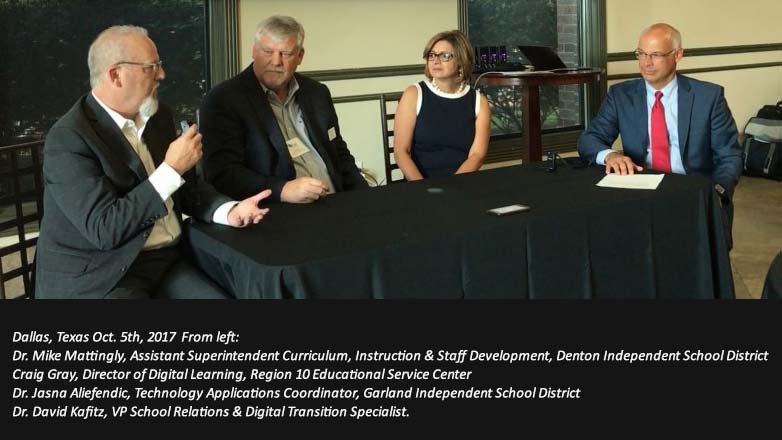When the Learning Counsel first started touring with our half-day events held in cities across the nation, most education executives we met were of a very different mood, on average, than they are today.
In 2014, we focused on a need for real strategy, a response to perceiving the mostly tactical move of distributed computers or iPads without any real plan for what would be done with them. What was great was the air of enthusiasm. Many schools videoed the first roll-outs, capturing the excitement of students.
Most schools are well past this now, and executives are now grappling with the complexity of the change being far more than anticipated. The mood has become a mixture of frustration, resolve, a bit of indifference, and a whole lot of overwhelm.
What needs to be pointed out is that this is the same thing any student feels as they tackle a new subject – before it is vanquished.
On October 5th, in Dallas, Texas, local education executives were engaged, doggedly following the lines of discussion, and taking notes. The Learning Counsel events tend to deliver information at the rate of a firehose, while trying to tie in earlier stages of school digital transition so no one gets lost.
What was impressive in Dallas--like it was in Portland, Los Angeles, San Diego, New York City and all the cities earlier this year--is the obvious maturity of the discussion. Many, many admonitions were made by speakers to the audiences to “not get left behind,” and to urge teachers to change their methods. Districts and schools are into some serious reconnaissance for the best digital software tools and mixes. A dozen or more comments about “failed” products and odd integration issues causing havoc have popped up.
Industry partners be warned, you can’t sell old “technology” for a bygone era and not get tarnished. If you’re leaning on textbook adoption laws to cram more paper into the sales pipeline, forcing that purchase on schools so they can get the digital versions, the market is on to you. They are very actively looking for go-arounds while secretly hating the entrapment, the cost, the lingering they must do in the past until slower-than-tech-change-governance can catch up and implement a new decree so they can finally throw off the burden.
In the meantime, districts and schools in the fray feel marginalized, and are either purely frustrated or guardedly indifferent, as if their greatly exasperating plight is immutable. It is true that some wanly smile and are buying paper textbooks still, having acquiesced to Boards, teachers, or parents they cannot fight and who don’t get it. These same buyers-of-the-old are unfortunately not trained to do digital curriculum mapping by the Learning Counsel, and some will decry how much software costs while blowing $20 Million on textbooks no one uses. Heaven help the companies doing this to schools because, by trickle-down, they are intentionally perpetrating industrial-era learning and creating ill-prepared students and an ill-prepared America. It’s not like there are no casualties – there are.
Related Story: Time to Amazon-Up in Education
Overall, education executives are in the middle of trying to implement several initial software products on wide or limited scales, while trying to get teachers to use them. They are seeing a small invasion of software apps, and a large amount of resistance. The resistance is the vast feet dragging by many teachers, and the inertia of the organization. It is this later that is not much pursued, since Boards must get involved and more. This later is what even the Superintendents mention, and are seeking guidance to overcome. It is not a simple answer, since the next revolution of the change wheel is going up from the classroom at the center to whirl out to the entire enterprise, deeply. The tinge of frustration is this; it is structural.
The mood is positive for the most part. It is becoming ever-more sophisticated. Leaders are looking for the discussion the Learning Counsel just touches on right now – the inevitable leveling up to becoming in-sync with the rest of the economy. There are no simple answers, not when what is happening is an overhaul of the distribution mechanics of learning, the work of the people, the awesome avalanche of data, the heightening demands of the public.
Stay tuned for our forthcoming “Systems Leadership Special Report,” particularly created to address the emerging needs.











